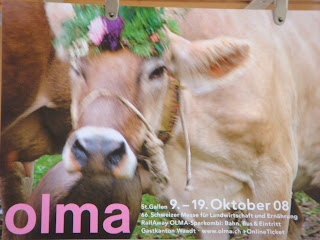
For the ones who haven't been through St. Gallen, I will introduce you to a very popular event that marks the town two weeks long every October.
It's called Olma Messe/ Olma Exhibition. You're probably imagining now pictures hanging on the wall or Greek and Roman sculptures.
You'll be surprised to find out that Olma it's not at all about art in its classical sense.
OLMA stands for "Schweizer Messe für Landwirtschaft und Ernährung", that is Swiss Exhibition for Agriculture and Nutrition. The farmers come to exhibit their animals and present their products (usually cheese and wine).
When I found out about this exhibition, I was quite amazed. Why? I didn't expect to see in a country such as developed as Switzerland such an "animals show".
This event still puzzles me and I wonder how come the agriculture plays such an important role, even though it doesn't bring a great value added to the GDP. However, the same is valid for France, too, where the farmers benefit from a comprehensive protection from the government, being largely subsidized.
But in Switzerland, the country of banks and pharma, why is agriculture important?
I have three hypothesis for this question:
1) It's a matter of national pride to have your own products which you market internally and in the EU markets. It's not only a matter of country pride, but also the Swiss consumers attach a premium value to a product to which they personally know the region of provenience.
2) This subsidization can also be looked at as the result of the "distributive function" of the government. By this I mean the distribution of the funds from the "haves" to the "have not-s". In this case, the transfer of money from the banks' and other multinationals headquartered in Switzerland, to the farmers who live in harsher living conditions.
3) This support can also be considered as a reward for the fact that farmers, by taking care of their assigned properties, contribute to maintaining the beauty of the Swiss landscape.
So, how can this help? What are the learnings for other countries, and especially Romania, from the story?
Let's take three take-aways:
1) We (Romanians) should start and brand our national products with more pride. As lots of Romanian consumer goods products and especially food is still traditionally cultivated, we should promote this particularity. We should, furthermore, try to market our products outside our country with more pride and actively participate at exhibitions. The premium price will follow as the brand will progressively become established.
2) We should try and promote the farmers' traditional way of life in Romania in our country image strategy. There are only few countries left in the EU (only Bulgaria), where this customary way of living is still alive.
3) We should be nationalists like other countries are (France, Switzerland, Austria) and choose our national food products if they provide a similar quality. That's how each of us can support the farmers' way of life, which further has a direct positive impact on Romania as a touristic attraction. Furthermore, this also helps maintain our country's identity.




No comments:
Post a Comment